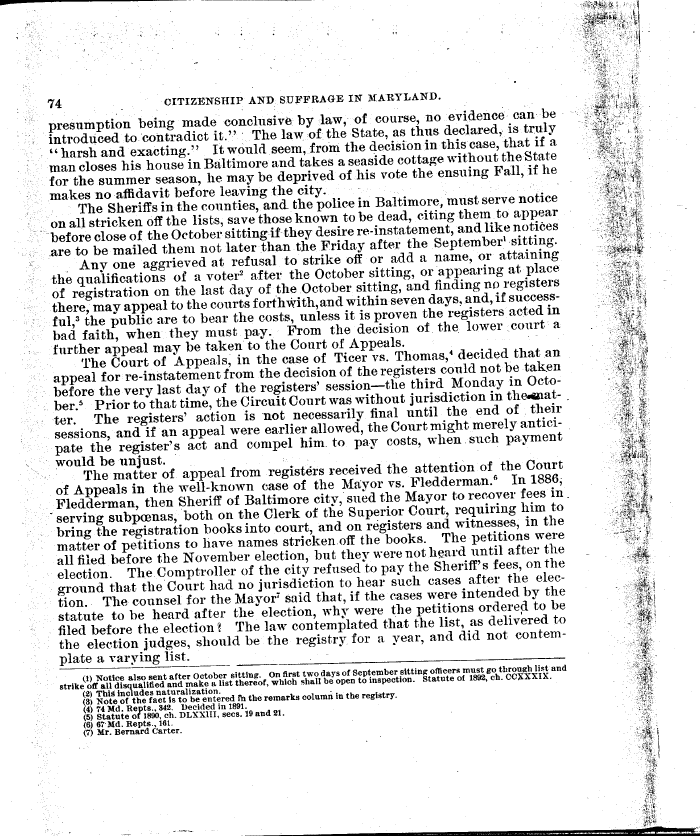|
74 CITIZENSHIP AND SUFFRAGE IN MARYLAND.
presumption being made conclusive by law,- of course, no evidence can be
introduced to contradict it." The law of the State, as thus declared,. is
truly
~~ harsh and exacting." It would seem, from the decision in this case, that
if a
man closes his house in Baltimore and tales a seaside cottage without the
State
for the summer season, lie may be deprived of his vote the ensuing Fall, if
he
makes no affidavit before leaving the city.
The Sheriffs in the counties, and the police in Baltimore, must serve notice
tin all stricken off the lists, save those known to be dead, citing them to
appear
before close of the October sitting if they desire re-instatement, and like
notices
are to be mailed them not later than the Friday after the September'
sitting.
Any one aggrieved at refusal to strike off or add a name, or attaining
the qualifications of a voter' after the October sitting, or appearing at
place
of registration on the last day of the October sitting, and finding no
registers
there, may appeal to the courts forth*ith,and within seven days, and, if
success-
fu1,3 the public are to beau the costs, unless it is proven the registers
acted in
bad faith, when they must pay. From the decision of. the, lower _ court a
further appeal may be taken to the Court of Appeals.
The Court of Appeals, in the case of Ticer vs. Thomas,' decided that an
appeal for re-instatement from the decision of the registers could not be
taken
before the very last day of the registers' session-the third Monday in Octo-
ber.' Prior to that time, the Circuit Court was without jurisdiction in
the.wat-
ter. The registers' action is not necessarily final until the end of their
sessions, and if an appeal were earlier allowed, the Court might merely
antici-
pate the register's act and compel him. to pay costs, when. such payment
would be unjust.
The matter of appeal from registers received the attention of the Court
of Appeals in the well-known case of the Mayor vs. Fledderman.' In 1886;
Fledderman, then Sheriff of Baltimore city, sued the Mayor to recover fees
in
serving subpoenas, both on the Clerk of the Superior Court, requiring him to
bring the registration books into court, and on registers and witnesses, in
the
matter of petitions to have names stricken.ofE the books. The petitions were
all flied before the November election, but they were not heard until after
the
election. The Comptroller of the city refused to pay the Sheriff's fees, on
the
ground that the Court had no jurisdiction to hear such cases after the elec-
tion. The counsel for the Mayor," said that, if the cases were intended by
the
statute to be heard after the election, why were the petitions ordered to be
filed before the election? The law contemplated that the list, as delivered
to
the election judges, should be the registry for a year, and did not contem-
plate a varying list.
(1) Notice also sent after October sitting. On first two days of September
sitting officers must go through list and
strike off all disqualified and make a list thereof, which shall be open to
inspection. Statute of 1892, ch. CCTL1IT7X.
(2) Thi3 includes naturalization. .
(8) Note of the fact is to be entered In the remarks column in the registry.
(4) 74 Md . Repts., 942. Decided in 1891.
(5) Statute o 1890, ch. DLSbIII, sees. 19 and 21.
(G) Bi Md. Repts.,1G1.
(i) Mr. Bernard Carter.
|

